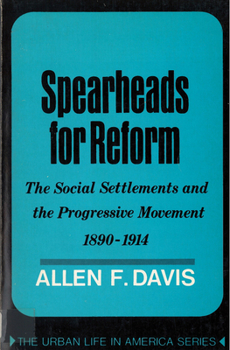Spearheads for Reform: The Social Settlements and the Progressive Movement, 1890-1914
Select Format
Select Condition 
Book Overview
Allen Davis looks at the influence of settlement-house workers on the reform movement of the progressive era in Chicago, New York, and Boston. These workers were idealists in the way they approached the future, but they were also realists who knew how to organize and use the American political system to initiate change. They lobbied for a wide range of legislation and conducted statistical surveys that documented the need for reform. After World War I, settlement workers were replaced gradually by social workers who viewed their job as a profession, not a calling, and who did not always share the crusading zeal of their forerunners. Nevertheless, the settlement workers who were active from the 1880s to the 1920s left an important legacy: they steered public opinion and official attitudes toward the recognition that poverty was more likely caused by the social environment than by individual weakness,
Format:Paperback
Language:English
ISBN:0813510732
ISBN13:9780813510736
Release Date:March 1985
Publisher:Rutgers University Press
Length:352 Pages
Weight:0.97 lbs.
Dimensions:1.0" x 5.5" x 8.5"
Related Subjects
History Political Science Politics & Social Sciences Social Science Social SciencesCustomer Reviews
1 rating
settlement house workers change the world
Published by Thriftbooks.com User , 19 years ago
Davis investigated the American settlement house movement in the period of the 1880's until the 1920's by focusing on the settlement house workers. They hoped to change the urban, industrial condition into what they considered a more equitable and pleasant environment. Boston, Chicago, and New York City led the country in innovative settlement house solutions and received the most attention in the work. Different progressive endeavors, such as educational reform, playground movements, labor relations, racial inequalities, and municipal reform, are related to the settlement house movement, and the author evaluated the influence which the settlement workers had on these other progressive ventures. Davis compared the settlement house experience to the Peace Corp. The settlement workers usually served a limited term after graduating from college and they emerged with a heightened sense of personal responsibility for the community, and displayed a willingness to undertake political action to meet their objectives. These progressive reformers worked toward a variety of goals after their training in the settlement houses, such as racial inequalities and educational reform. The settlement experience created a coterie of dedicated, mostly upper middle class, college educated reformers hoped to change the conditions of the working and immigrant classes. The settlement house experience significantly influenced the manner in which a generation viewed government and workers. He believed its influence endured beyond the actual settlement houses and exposed it in the legislation of the New Deal. In concentrating on the settlement house workers themselves, Davis ignored the actual working class people who endured their ministrations. Their reaction to these efforts remained largely overlooked in the book. Davis cited their resistance to the reforms, but he belittled their reluctance to fully espouse these middle class Protestant values. Davis presented a sympathetic view of the progressive settlement house workers. He failed to evaluate their reception into the communities which they hoped to alter to meet their own standards.






